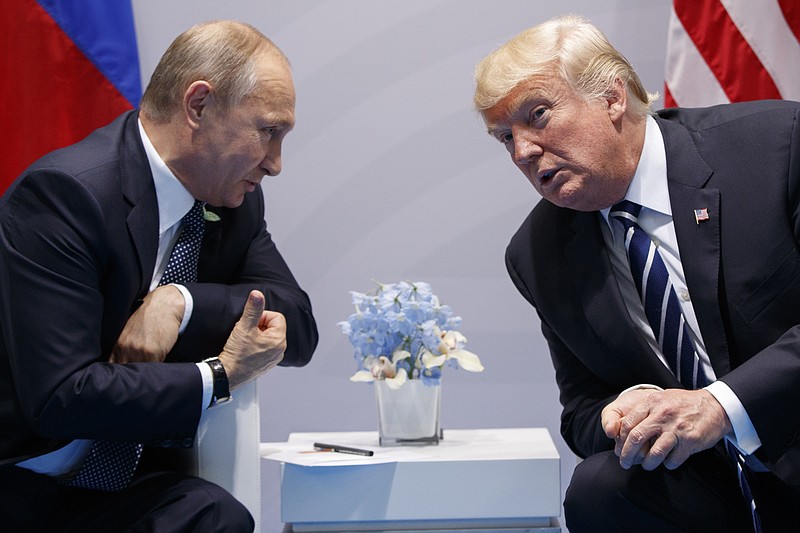When is enough going to be enough of Trump and his campaign's increasingly suspect denials of collusion with Russia's effort to meddle in our election?
A startling New York Times story Sunday still might not be the smoking gun of the Trump-Russia 2016 story, but it's hot enough to smoke.
The Times reports that President Trump's oldest son, Donald Trump Jr., met with a Kremlin-connected lawyer in June 2016 after being promised damaging information on Hillary Clinton. And Junior wasn't alone. Also in the meeting were President Trump's then-campaign chairman Paul J. Manafort and Trump's son-in-law, Jared Kushner.
The Times revelation of that June 9, 2016, meeting in Trump Tower is important because it is the first public indication that at least some in the campaign were willing to accept Russian help.
In less than 24 hours, with the story grabbing headlines everywhere, Junior changed his story.
He initially told The Times in March that he did not participate in campaign-focused meetings with Russian nationals. When the Times first reported the meeting's existence in an online edition Saturday, he admitted that it took place, but said it was primarily about an adoption program - which he said was "not a campaign issue." He also said an acquaintance he knew from the 2013 Miss Universe pageant in Moscow set up the meeting, and he didn't even know the name of the person he was meeting.
So why were three top campaign operators wasting their time in a June 9, 2016, Trump Tower meeting just as the primary season was ending with Trump and Hillary Clinton named as the presumptive party nominees? A meeting about adoption with someone whose name they did not know?
On Sunday, Trump Jr. acknowledged he met with Russian lawyer Natalia Veselnitskaya after being told she had damaging information about Clinton. Once they met, he said he determined she had "no meaningful information" and that she just wanted to talk about sanctions.
If you have whiplash, so do we. But, borrowing from an NBC Trump-Russia timeline, here's what else was going on as and after Trump Jr., Kushner and Manafort met with Veselnitskaya:
* June 9: Trump tweets Clinton in the afternoon of the day the meeting occurred asking " and where are your 33,000 emails that you deleted?"
* July 18: On the first day of the GOP convention, the Trump campaign changed the Republican platform to ensure that it didn't call for giving weapons to Ukraine to fight Russian and rebel forces.
* July 22: On the day after GOP convention ended and Trump accepted the nomination, WikiLeaks releases stolen emails from the Democratic National Committee.
* July 25: Democratic convention begins.
* July 27: In a news conference in his 2016 campaign (and on the second day of the Democratic Convention), Trump looks directly into the camera and says: "Russia - If you're listening, I hope you're able to find the 30,000 emails that are missing."
* Oct. 4: WikiLeaks' Julian Assange says his organization will publish emails related to the 2016 campaign.
* Oct. 7: Department of Homeland Security and the Director of National Intelligence release a statement directly saying that Russia is interfering in the 2016 election.
* Oct. 7: That same day, WikiLeaks begins releasing Clinton Campaign Chairman John Podesta's emails.
* Oct. 31: "This WikiLeaks is like a treasure trove," Trump says on the campaign trail.
* Nov. 4: "Boy, I love reading those WikiLeaks," Trump says while campaigning in Ohio.
It's also worth noting that Veselnitskaya isn't just any Kremlin-connected attorney, and her Russian adoptions cause isn't as innocent as it sounds. Her most notable Kremlin-agenda effort is an anti Magnitsky Act campaign. The Magnitsky Act - signed into U.S. law in 2012 by President Barack Obama and named for Sergei L. Magnitsky, a lawyer and auditor who died in mysterious circumstances in a Russian prison in 2009 after exposing one of the biggest corruption scandals during Vladimir Putin's rule - provoked a Cold War-style, tit-for-tat row between the Kremlin and the U.S.
Under that law, 44 Russian citizens have been put on a list that allows the U.S. to seize their American assets and deny them visas. The U.S asserts that many of them are connected to fraud exposed by Magnitsky.
Putin called the law an "outrageous act," and, in addition to banning American adoptions of Russian orphans, Putin compiled what became known as an "anti-Magnitsky" blacklist of American citizens - including Preet Bharara, the former U.S. attorney in Manhattan who led high-profile convictions of Russian arms and drug dealers. Bharara was abruptly fired by Trump in March, after previously being asked to stay on.
And did we mention that this is now one of dozens of contacts with foreign leaders or officials that Trump son-in-law Kushner "forgot" to mention in disclosures required to gain a top-secret security clearance? In a campaign, how do you forget a meeting with a top Kremlin attorney offering dirt on your opponent? (He has since, belatedly, disclosed this and other meetings.)
It's time for King Trump and his royal family and their overwhelming coziness with Russia to be removed from our White House.
